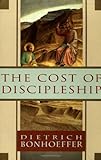 A book
A book one is supposed to have read already, of course. It is a really mixed bag, though, IMO. There is the classic stuff (Costly vs. Cheap grace), the really good (the political stuff) and the mediochre, stuff that can only be described as conservative repetition of formulas and clichés. Considering the status of the book, the last category is the most interesting. My fairly uninformed theory is that Bonhoeffer when writing this in his twenties had not had time to actually think through all these things yet, and at times revert to standard half-thought ideas. Case in point, the chapter on asceticism, which obviously is of special interest to me, contains some interesting points, but his uncritical use of the traditional idea of ”punishing the flesh” without in any way discussing what ”the flesh” is to me suggests a kind of shallowness in many of these chapters. Although the notion that ”by practicing abstemiousness we show the world how different the Christian life is from its own” is of course spot on.
There are unforgivable weaknesses here, though. Even in 1936 to put the heading ”woman” over a chapter that deals with (men’s) desire and purity only is absurd. He is commentating the sermon on the mount, so the topic is kind of giving, but why imply that this is a chapter about ”woman”?
So yeah, there is stuff here I find usefull, and will use in my book on post-folkchurch ecclesiology, but the overall vision is at least problematica.
”Ethics” is next.





